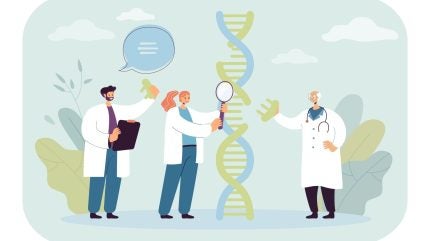
A patient with a rare progressive neurodegenerative disorder receiving a personalised experimental antisense oligonucleotide (ASO) treatment developed by the non-profit n-Lorem has reported improvements in seizure severity and quality of life.
The patient, named Susannah, has a rare condition called KIF1A-associated neurological disorder (KAND). US-based non-profit n-Lorem developed a personalised, experimental ASO medicine specific to Susannah’s genetic mutation. After receiving her first dose of the personalised medicine, her seizures fell to under 30 per week and she has remained stable.

Discover B2B Marketing That Performs
Combine business intelligence and editorial excellence to reach engaged professionals across 36 leading media platforms.
KAND is caused by mutations in the KIF1A gene, leading to progressive motor impairments, developmental delays, and cognitive difficulties. Management of KAND mainly focuses on addressing symptoms and improving quality of life through supportive therapies, like speech or physical therapy. There are no other therapies for KAND in clinical development, as per GlobalData’s Pharma Intelligence Center.
GlobalData is the parent company of Pharmaceutical Technology.
Following the ASO treatment, the patient’s ability to walk also improved after one month; compared to having an average of 26.2 falls per day before treatment, she now experiences up to seven falls daily, with many days without any falls.
Data from the study published in Nature Medicine also detail notable advancements in speech, attention, group interaction, and motor functions, while the patient’s cognitive abilities have remained stable. Susannah has continued on the ASO treatment for 20 months, with a favourable safety and tolerability profile.

US Tariffs are shifting - will you react or anticipate?
Don’t let policy changes catch you off guard. Stay proactive with real-time data and expert analysis.
By GlobalDataASO therapies work by using short, synthetic strands of nucleic acids to target and modify specific genes, reducing the production of harmful proteins or correcting genetic defects. The treatment developed by n-Lorem targets and corrects the harmful version of the KIF1A gene.
Founded by former Ionis Pharmaceuticals’ CEO Stanley Crooke, n-Lorem aims to bring ASO therapies to patients who are diagnosed with a disease that is found in less than 30 people. Research physicians submit an application to the non-profit, which examines if the patient’s genetic mutation is amendable to the ASO technology. More than 130 patient applications have so far been approved by the organisation for a range of different mutations.
There has been an increase in the number of nonprofits developing rare disease medications where the patient population size is too small for commercialisation. Italian research charity Telethon Foundation manufactures and distributes Strimvelis, a gene therapy for rare disease adenosine deaminase severe combined immunodeficiency (ADA-SCiD). The non-profit took over development after it was dropped by its pharmaceutical company in 2022, allowing patients to receive treatment.
ASO therapies have long been investigated in rare diseases because they target the cause of disease at the molecular level. Researchers have also developed candidates that are approved to treat conditions affecting larger patient populations.
Biogen’s ASO Spinraza (nusinersen) secured approval for treating the movement disorder spinal muscular atrophy in 2016, pulling in $610.5m in sales in 2023 as per the company’s financials.
In the announcement accompanying the case study, n-Lorem’s CEO Stanley Crooke said: “Prior to treatment, Susannah’s disease had progressed to her being mostly in a wheelchair, approaching nonverbal with debilitating seizures that limited her and her family’s quality of life. Susannah has now been on treatment for more than 20 months and we continue to observe improvements in her mobility, neurological function, and quality of life.”
The non-profit, which launched in 2020, is also conducting a KIF1A outcome measures, assessments, longitudinal and endpoints (KOALA) study to understand how KAND symptoms develop and change over time.




